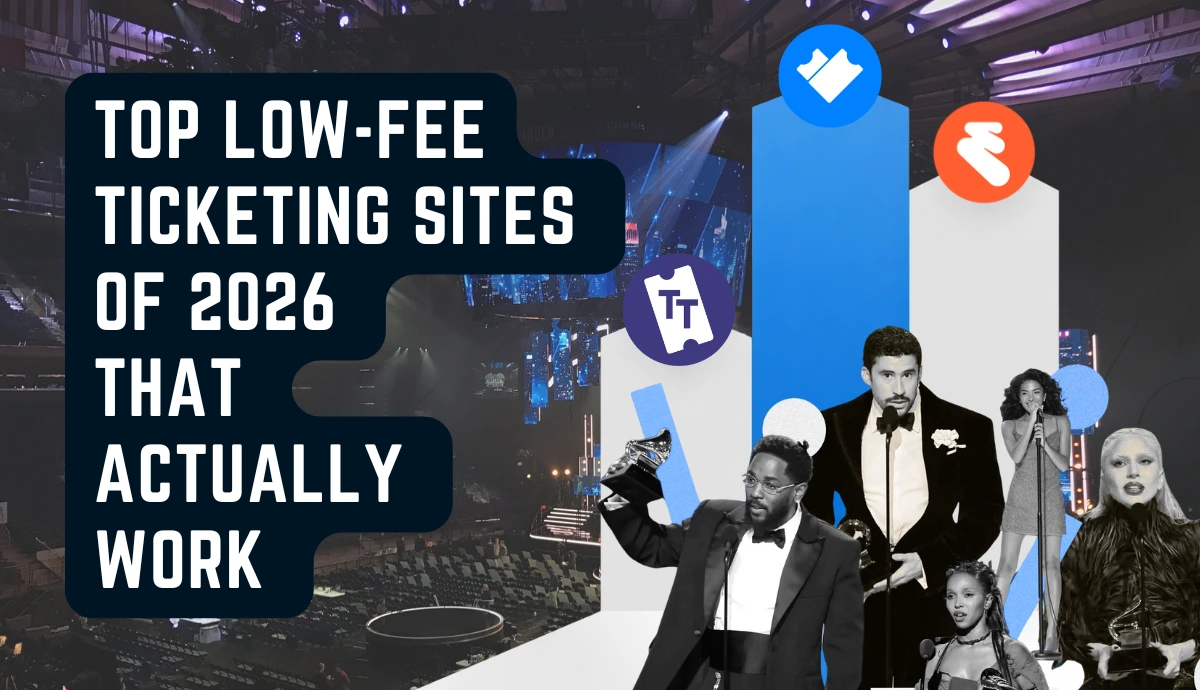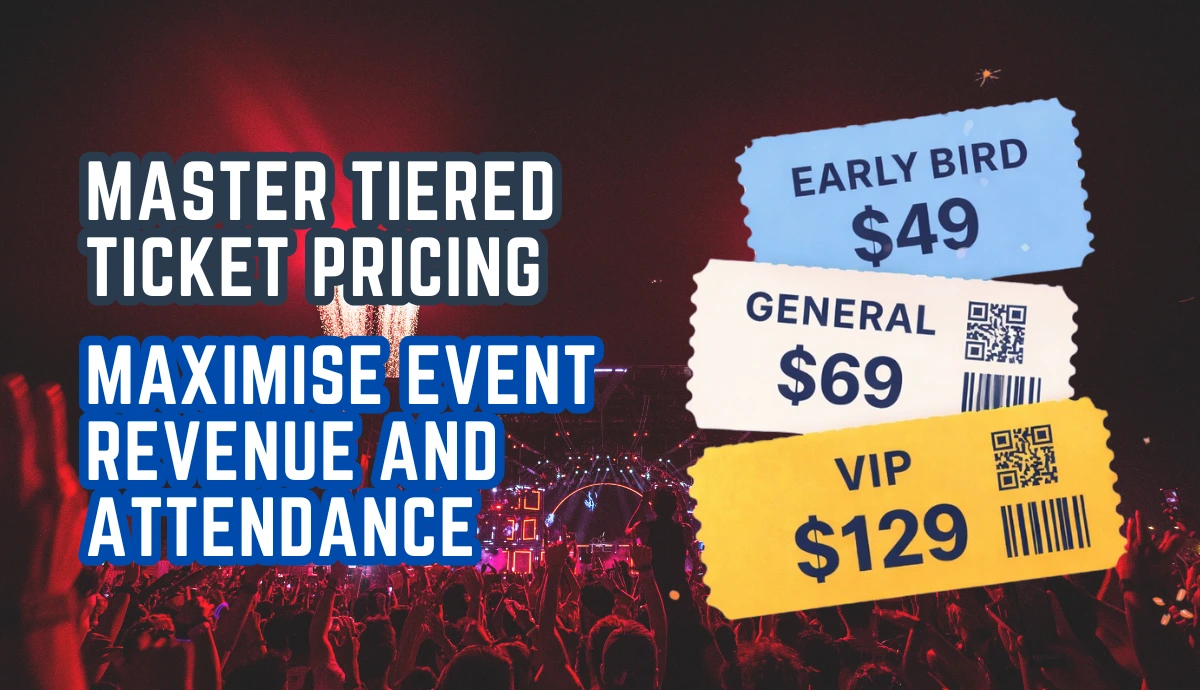Ever felt lost trying to pick the right concert ticket types? Many organizers struggle with all the different types of concert tickets out there. And this confusion? It costs money and leaves fans unhappy.
Here's the thing: ticketing isn't what it used to be. Those simple paper tickets from years ago? They're history. Today's concert ticket categories offer endless options. Each one serves a purpose. Each one reaches different fans.
While figuring out ticket types matters, organizers also need to create professional event tickets that look great and clearly show their value.
Running a first small show? Managing a big tour? Either way, knowing various types of concert tickets isn't just nice to have—it's a must. Fans want options. Venues need to fill seats. The bottom line depends on getting this right.
Time to dive in and decode the world of concert ticketing.
A. What are concert ticket types?
Concert ticket types are different ways to sell admission to shows. Think of them as options on a menu. Some cost more. Some cost less. Each one gives fans a different experience at the same event.
Why do types of concert tickets exist? Simple. People want different things. A college student on a budget wants to see their favorite band without breaking the bank. A business executive might pay extra for comfort and perks. Smart organizers offer choices for everyone.
Today's concert ticket categories do more than just let people in. They help control crowds. They create special experiences. They help venues make the most money while keeping fans happy. Each ticket type makes a promise. General admission promises energy and freedom. VIP tickets promise luxury and exclusivity.
Digital ticketing changed everything. Now, organizers can change prices on the fly. Fans can upgrade last-minute. Personal touches that weren't possible with paper tickets are now standard. Getting to know these options? That's step one in planning a great event.
B. What are the most common concert ticket types?
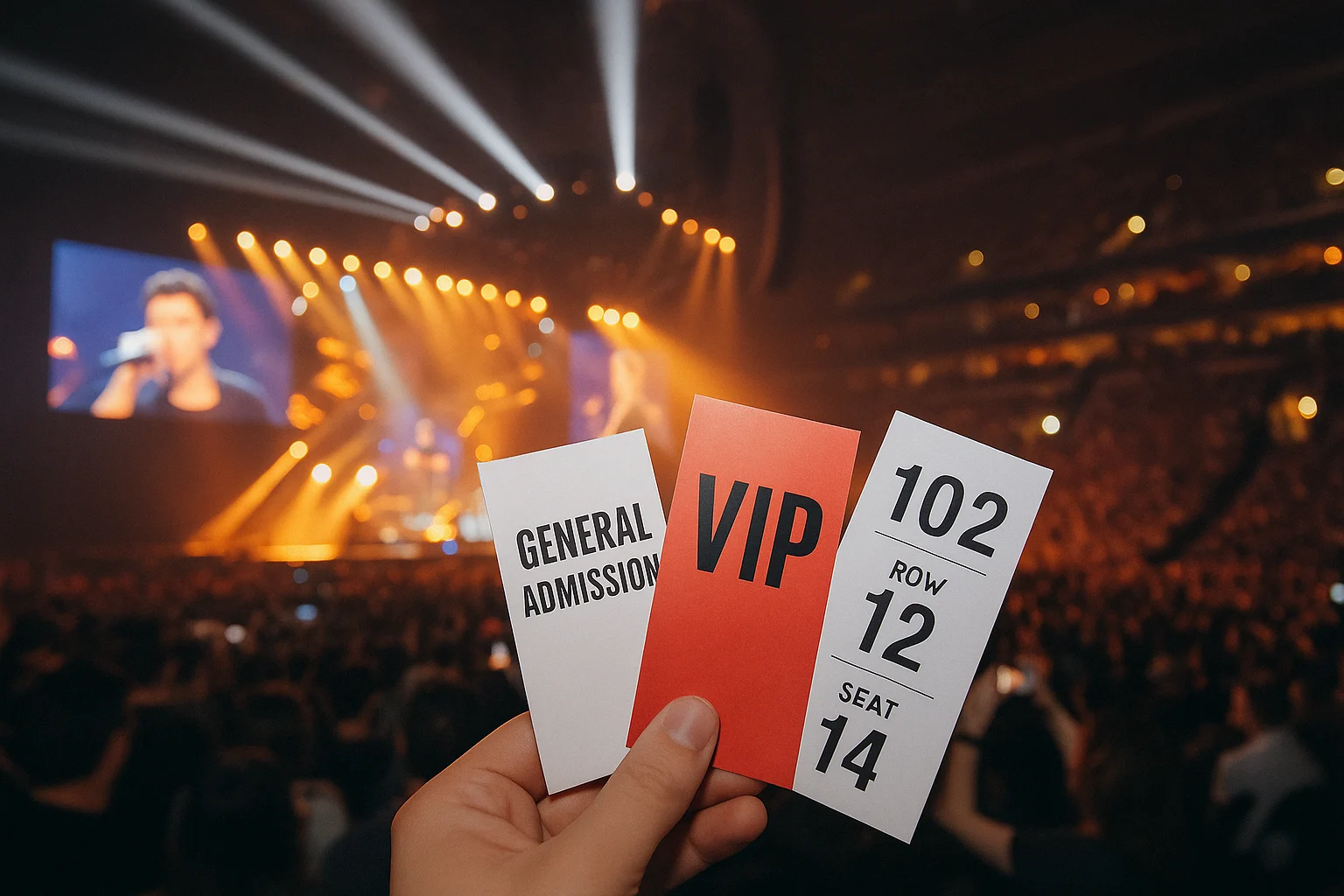
1. General admission (GA)
General admission is the workhorse of concert tickets. Buy a GA ticket? Get in the door. No assigned spot. First come, first served. These tickets cost the least, making concerts affordable for more people.
GA creates the classic concert vibe. Show up early for a spot near the stage. Prefer space? Hang back by the bar. This freedom builds the energy that makes live music special. The downside? Standing all night. Crowds pushing forward. Not everyone's cup of tea.
2. Reserved seating
Reserved seating takes the stress away. Buy a ticket, get a specific seat. No racing to the venue. No saving spots. This concert ticket type works for people who value comfort over spontaneity. Front section seats cost more. Back section seats cost less. Simple as that.
Picked the ticket types? Great. Next comes designing your concert tickets to show fans exactly what they're buying. Clear design prevents confusion at the door.
3. VIP/Premium tickets
VIP packages are the luxury option of concert ticket categories. What's included? Maybe premium seats. Maybe exclusive merchandise. Sometimes meet-and-greets. Perhaps VIP lounge access. Prices vary wildly, but true fans and experience seekers happily pay up.
4. Standing room only
Standing room splits the difference. These tickets give a designated area—just no seat. Usually along venue walls or behind seated sections. Perfect when seated tickets sell out, but fans still want in. Comfort depends on the venue layout.
5. Pit/Floor access
Pit tickets put fans right at the stage. Nothing beats this for die-hard fans. Most pit tickets include early entry. Why? To claim the best spots before general admission floods in. The trade-off? Premium prices for premium access.
6. Lawn/Amphitheater seating
Outdoor venues offer lawn seating—bring a blanket, claim a spot. These tickets cost less than reserved seats. Perfect for summer concerts. Enjoy the music under the stars. The catch? Weather matters. Distance from stage varies. But the relaxed vibe? Priceless for many fans.
These common concert tickets types form the foundation of any event. Start here. Build from here. Each venue and artist brings unique needs, but these basics work everywhere. The trick? Balance the mix. Too many options confuse buyers. Too few limit revenue. Find the sweet spot for each show.
C. What special ticket categories should you consider?
1. Early bird tickets
Early bird tickets reward fans who plan ahead. Buy early? Save money. This concert ticket type helps organizers too. Early sales mean early cash flow.
They show how much buzz the event has. Just set a clear deadline. When early bird ends, prices go up. Creates urgency. Fills seats faster.
2. Group/Bundle packages
Groups make concerts more fun. So why not reward them? Group packages—usually 4 or more tickets—save everyone money. Friends plan together. Families attend together. The organizer wins too. One purchase, multiple tickets. Higher sales, happier crowds.
3. Student/Senior discounts
Fixed incomes shouldn't mean missing great shows. Student and senior discounts open doors. Require valid ID at entry. Keeps the system honest. Shows the venue cares about the community. Everyone deserves live music.
Concert venues protect their tickets just like movie theaters secure theirs. Every ticket type needs anti-fraud features. Holograms, special inks, QR Codes—whatever stops fakes and keeps events safe.
3. Season passes
Got multiple shows coming up? Season passes build loyal fans. One price, multiple concerts. Maybe all shows in summer. Maybe credits to use anytime. Fans feel like members of a club. Venues get guaranteed revenue upfront. Win-win.
4. Meet & greet packages
Some fans want more than music. They want memories. Meet & greet packages deliver. Photos with the artist. Autographs. Maybe a quick chat. These exclusive moments cost serious money. But for superfans? Worth every penny.
5. Soundcheck experience tickets
Behind-the-scenes access sells. Soundcheck tickets let fans watch pre-show prep. See how the magic happens. Hear songs before anyone else. Priced between regular and VIP tickets. Perfect for music nerds who love the technical stuff.
Special ticket categories aren't just add-ons. They're strategic tools. Mix and match based on the audience. Test different combinations. Some shows need early bird incentives. Others thrive on VIP experiences. The key? Know the fans and give them options that make sense.
D. How do digital and physical ticket formats compare?
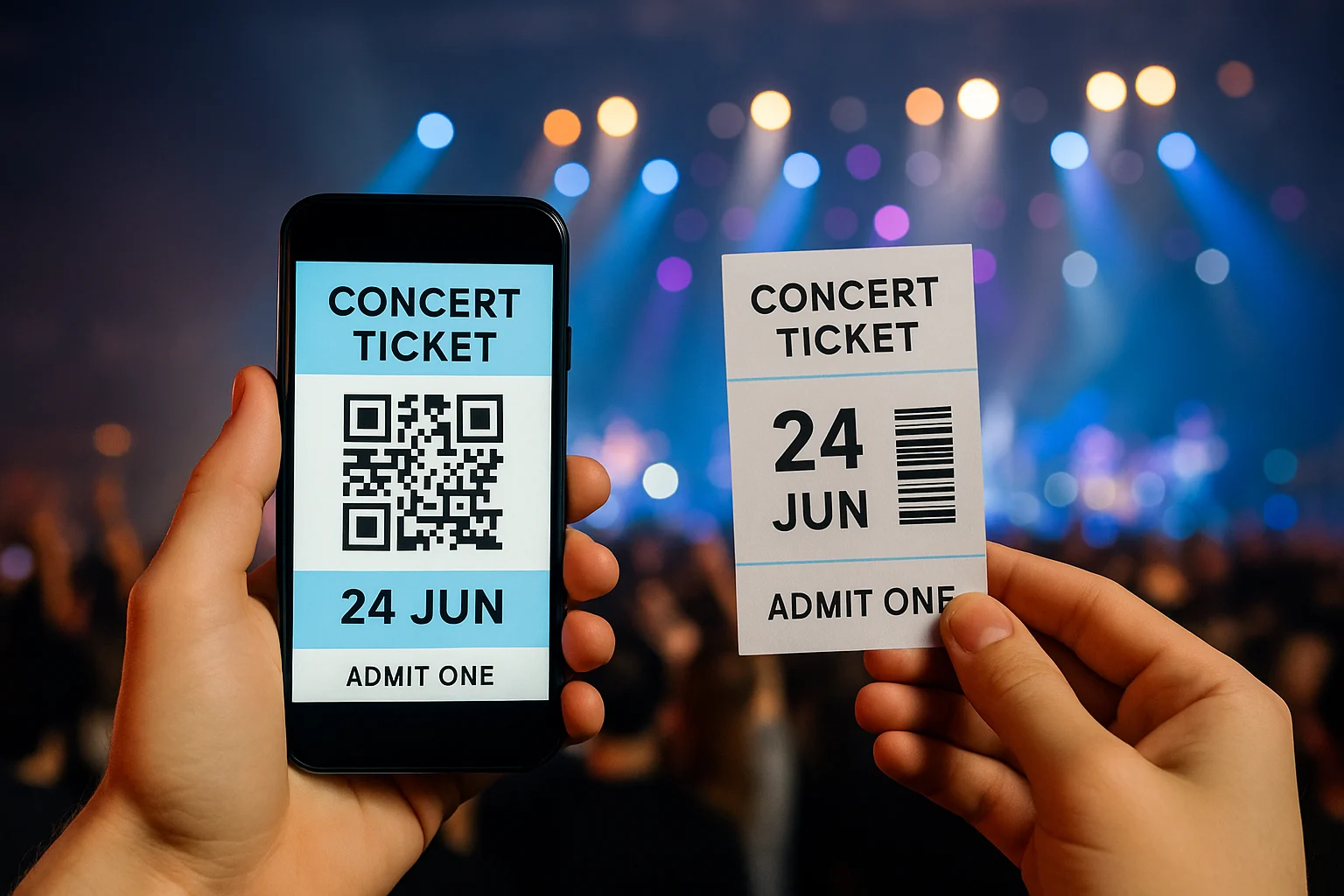
The battle between paper and pixels changed how concert tickets work. Each format has pros and cons. Smart organizers know when to use which—or both.
Mobile/Digital tickets rule the market now. Buy online, get tickets instantly. No shipping. No lost tickets. QR Codes change in real-time, stopping screenshot scams.
Fans can transfer tickets with a tap. The catch? Dead phones mean no entry. No internet? Big problem. Some older fans struggle with the tech.
Print-at-home options bridge old and new. Fans print when ready. Organizers save on shipping. Everyone wins, right? Not quite. Home printers vary. Cheap ink smudges. Paper jams happen. Scanning problems at the door frustrate everyone.
Traditional hard tickets still have fans. Real tickets become keepsakes. Great for gifts—try wrapping a QR Code. Collectors love them. Artists sell special designs as merch. But printing costs money. Shipping takes time. Lost tickets can't be replaced easily.
RFID wristbands shine at festivals. One band, multiple days. Add cashless payments. Track crowd flow. Collect valuable data. Yes, they cost more upfront. But for multi-day events? The benefits usually win. Less fraud. Faster entry. Happy fans.
QR Code tickets became the gold standard. Why? Security beats everything else. Codes update instantly. Duplicate tickets? System catches them. Venue changes? Push updates immediately. Cancellations? Instant refunds. The technology just works.
Physical or digital? The answer depends. Know the audience. Test the venue's tech. Consider the event type. Stadium shows with young crowds? Go digital. Intimate venue with older jazz fans? Offer print options. Outdoor festival? RFID wins. Mix formats when needed. Give fans choices. Technology should help, not hinder.
E. How to choose the right mix of ticket types
Picking the right concert ticket categories feels like solving a puzzle. Every piece must fit. Start with data. End with happy fans and healthy profits.
Understanding your audience demographics comes first. Age matters. Income matters. Location matters. Young crowds love GA floors and group deals. Older fans? They want seats and easy parking. Survey past attendees. Check social media. Look at similar events. Data beats guessing every time.
Venue layout considerations shape everything. Some venues scream for GA. Wide open floors. Great sightlines everywhere. Others need assigned seats. Multiple levels. Odd angles. Walk the space. Test different spots. Where's the bar? The bathrooms? Emergency exits? Layout drives options.
Every event type differs. Rock concerts aren't jazz shows. EDM festivals aren't acoustic sets. What works for concerts might not work for charity events or graduation ceremonies. Match tickets to the vibe.
Event type and artist factors matter too. Metal bands? Fans expect pit access. Singer-songwriters? All seats work better. Ask artists their preference. Some hate VIP meet-and-greets. Others love them. Some want GA only. Others demand seats. Work together for best results.
Pricing strategy alignment keeps budgets balanced. Premium tiers fund cheaper tickets. This creates access for everyone. Set clear goals. Need to break even? Maximize revenue? Build community? Different goals need different strategies. Dynamic pricing helps, but stay transparent. Nobody likes surprise fees.
Creating ticket tiers needs careful thought. Three to five options usually work best. Too many? Paralysis. Too few? Lost opportunities. Make each tier clearly different. Big price jumps show big value jumps. Confused customers don't buy. Clear choices sell tickets.
The perfect mix doesn't exist. But the right mix for each show? That's achievable. Test. Learn. Adjust. What worked last time might fail next time. Stay flexible. Listen to feedback. Success comes from matching tickets to audiences, not forcing audiences into ticket types.
F. What are the best practices for implementation?
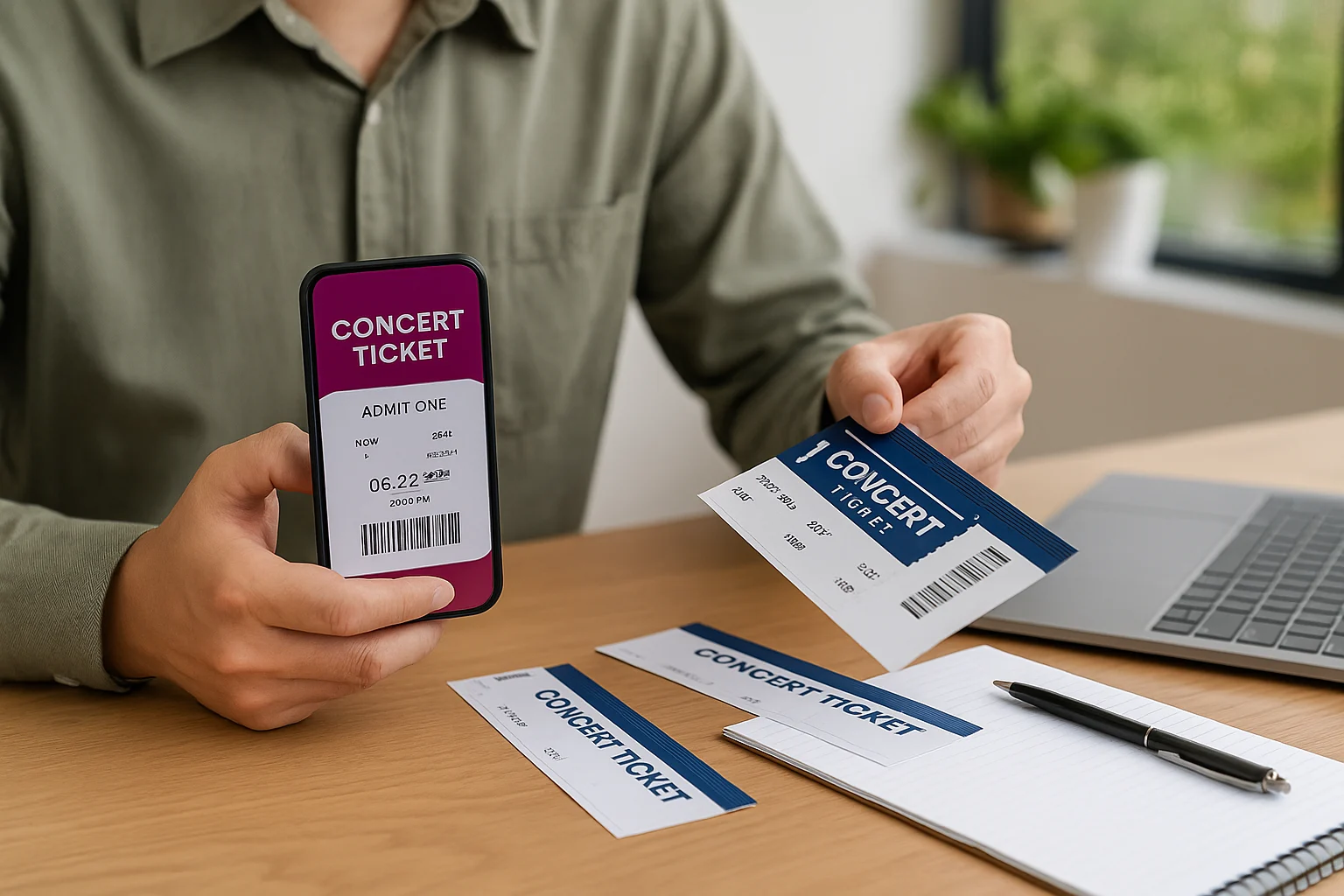
Getting different types of concert tickets right takes more than good ideas. Success lives in the details. Here's how to nail the execution.
Clear naming conventions save headaches. "GA FL" means nothing to most people. Try "General Admission - Floor" instead. "SEC A ROW 12"? Make it "Section A - Row 12." Spell it out. Make it obvious. Confused customers call support. Clear names sell themselves. Test names on friends who don't know venues. If they get it, everyone will.
Transparent pricing builds trust fast. Show all fees upfront. That $50 ticket that becomes $67.50 at checkout? Kiss those customers goodbye. Include everything in the listed price. Yes, even service fees. Tell people what they get. "Includes parking" beats discovering parking costs $20 later.
Party organizers and prom event planners know this well. Every event needs its own approach. What works for a rave won't work for an acoustic set.
Benefit communication sells tickets. "VIP Package" sounds nice. "Skip the lines, free drinks, private bathrooms, and artist meet-and-greet" sells tickets. Paint the picture. Help fans see themselves enjoying these perks. List everything included. Use photos when possible. Show, don't just tell.
Time to create the actual tickets? A good concert ticket generator speeds up the process. Professional designs. Security features. Consistent branding. All ticket types look cohesive while staying distinct.
Inventory management prevents disasters. Hold back 5-10% of tickets. Why? Band guests need spots. Sound equipment might block views. Things go wrong. Release held tickets gradually as show dates approach. This creates last-minute buzz too. Sold out shows can suddenly have tickets available.
Accessibility options show venues care. Wheelchair spaces across all price levels. Not just the back rows. Companion seats next to them. Sign language interpreters for certain shows. Clear info on the website. Train staff to help. Make everyone feel welcome.
Best practices evolve. What worked yesterday might fail tomorrow. Stay curious. Ask for feedback. Watch what successful venues do. Steal good ideas. Avoid their mistakes. Most importantly? Put fans first. Happy fans buy tickets. Happy fans come back. Happy fans tell friends.
G. What mistakes should you avoid?
Even smart organizers mess up concert tickets sometimes. These common mistakes hurt sales and anger fans. Learn from others' pain.
Too many form fields kill sales. Every extra field loses customers. Name? Essential. Email? Needed. Phone, address, birthday, favorite color? Stop. People abandon carts. Keep it simple. Ask only what's absolutely necessary. Save surveys for after the show. Get the sale first.
Hidden fees destroy trust instantly. Nothing makes fans angrier than surprise charges. That $40 ticket suddenly costs $55? Social media will roast the venue. Bad reviews last forever. Build real prices from the start. Include all costs. Yes, it looks more expensive. But honest pricing wins long-term.
Complex checkout processes send fans to competitors. Three pages to buy one ticket? Password requirements with 12 special characters? Mandatory account creation? Stop torturing customers. Guest checkout should always exist. Make buying easier than ordering pizza. Simple wins.
Limited payment options exclude buyers. Credit cards aren't enough anymore. Where's PayPal? Apple Pay? Google Pay? Buy now pay later for expensive packages? Different people prefer different methods. International fans need their local options. More payment methods mean more sales.
Poor mobile experience ignores reality. Most fans buy tickets on phones now. Tiny buttons nobody can tap. Forms that don't fit screens. Desktop-only features. Test everything on phones first. Then test on tablets. Desktop comes last. If it doesn't work on mobile, it doesn't work.
Avoiding these mistakes isn't hard. It just takes attention. Put yourself in the fan's shoes. Try buying your own tickets. Feel the friction points. Fix what frustrates. The smoothest experience wins. Always.
H. People also ask
1. What's the difference between GA and reserved seating?
GA (general admission) means no assigned spots—first come, first served. Reserved seating guarantees a specific seat. GA costs less but requires standing. Reserved costs more but offers comfort.
2. How much should VIP tickets cost?
VIP tickets typically cost 2-4 times regular admission. Price depends on perks included. Meet-and-greets command the highest premiums. Test different price points to find what fans will pay.
3. Can I offer both digital and physical tickets?
Yes. Offering both formats reaches more fans. Younger crowds prefer mobile tickets. Some fans want physical keepsakes. Let buyers choose at checkout.
4. What's the best ticket type for small venues?
Small venues often work best with GA or limited reserved seating. Depends on the venue layout and the audience. Standing rooms create energy. Seated shows offer comfort. Know your crowd.
5. How many ticket types should I offer?
Three to five ticket types work best. Too few limit options. Too many confuses buyers. Include one budget option, one premium option, and 1-3 mid-range choices.
6. Do I need special software for different ticket types?
Yes. Professional ticketing software manages inventory, pricing, and sales for all ticket types. Manual systems can't handle complex offerings. Invest in proper tools.
7. What ticket types sell out fastest?
Pit access and VIP packages usually sell first. Early bird discounts go quickly too. GA tickets often last longest due to higher inventory. Monitor sales patterns for your specific events.
8. Should every concert have VIP tickets?
Not necessarily. VIP works for established artists with dedicated fans. New acts might struggle to sell premium packages. Test demand before committing to expensive VIP perks.
I. Conclusion
Concert ticket types make or break events. GA creates energy. Reserved seats offer comfort. VIP packages build exclusivity. Each serves a purpose. The right mix fills venues and satisfies fans.
Success comes from knowing the audience and giving them options that make sense. Fair prices. Clear benefits. Simple buying process. Get these right, and tickets sell themselves.
Ready to level up your ticketing game? Explore Ticket Generator's solutions and start creating better events today.

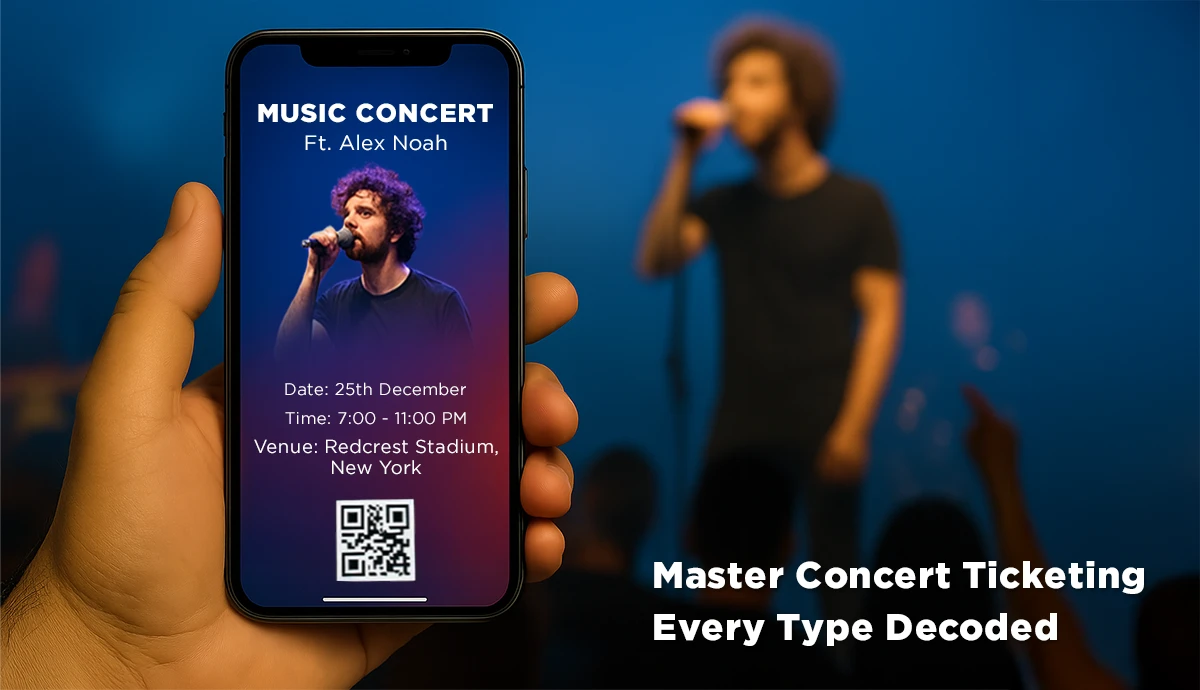







.gif)
